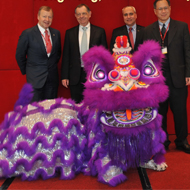
"Inconsistent" health regulations among topics at three day event
The world organisation for animal health (OIE) is in the midst of a three-day workshop for government veterinary and animal health experts from 20 nations across Asia and Oceania.
The event which will discuss the international movement of sport horses, is the first of its kind to be held in Asia, and is organised by the International Federation for Equestrian Sports (FEI), the International Federation of Horseracing Authorities (IFHA), the Agriculture, Fisheries and Conservation Department (AFCD) of the Hong Kong Government and the Hong Kong Jockey Club (HKJC).
Sessions at the workshop will focus on the extensive global growth of the sport horse industry over the last decade.
The sport faces serious challenges due to what the OIE calls the "inconsistent approaches of health regulations and quarantine of competition horses, leading to excessive and irregular health requirements for temporary importation".
“The OIE recognises the value of the equine industry, not only because of the increased number of equestrian events worldwide, but also in terms of creating employment,” said Dr Bernard Vallat, director general of the OIE.
“However, we recognise that much of the growth in the horse industry is taking place in the traditional horse sport regions of the world - Europe, North America, Canada and Australia. So facilitation of international horse movement would also allow for emerging countries and regions to tap into the economic potential associated with an increase in numbers of equestrian events, be it FEI sport or horse racing.
"The concept of identifying a sub population of high health, high performance horses, in line with the OIE Standards and Principles, is designed to address the perceived issues in terms of global movement of horses.”
The workshop opened yesterday (18) at the Happy Valley Racecourse (HKG).
FEI President HRH Princess Haya said: “Some of the world’s most valuable and supervised horses are now competing for the biggest prizes on the planet here in Asia .
"Recently, we saw the South East Asian Games in Myanmar; next year the Asian Games will be held in Incheon, in the Republic of Korea and in 2020, the Olympic Games will come once again to Asia and the eyes of the world will be focused on this region.
"But international equestrian sport cannot take place without the temporary importation of high health, high performance horses and at present the approach to moving these horses between countries in the region is extremely dis-harmonised and does not take into account their lower disease risk or their high level of supervision.
"The single objective of this week’s session is to establish a better approach to the temporary importation of high performance horses, which is in line with established OIE principles and acknowledges that they present a low risk. This approach needs to be transparent, consistent, fair, efficient and safe.”
Ingmar De Vos, FEI secretary general said: “The growth of horse sport around the world has already created a lot of awareness and understanding of the issues we are facing, and it is encouraging to see that this has had a major positive impact on nations on many levels, on the horse sport industry and of course on athletes who are striving to represent their country at key international events, including the Olympic and Paralympic Games.”
Chief executive of the HKJC and vice chairman of the IFHA, Winfried Engelbrecht-Bresges, said: “It is vital for the growth of equestrian sport internationally that the movement of horses becomes smoother, without jeopardising the health status of horses around the world.
"From the IFHA’s perspective, we want to enable the world’s best horses to participate in the world’s leading events. Cross-border competition is, of course, good for the sport, but it also improves the breed, as increased global competition helps to identify the best horses, many of whom are then involved in the breeding cycle. This historic workshop over the next three days is a wonderful opportunity for continued dialogue between all of us who are striving to make progress in this area and I am grateful to everyone here for their attendance and their input.”
Dr Ko Wing Man, secretary for food and health of the Hong Kong Government, said: “Globally, the international transportation of competition horses has become more extensive and frequent in the course of time, driven by a steady growth in the number of events involving competition horses.
"Unlike places such as Europe and North America where equine sport is very well established, significant room exists for expansion in territories including Asia. Our common goal is to establish a framework for countries and regions to harmonise the approach to facilitating the movement of sport horses, including the formulation of temporary import conditions that would help minimise the risk of trans-boundary disease transmission.”
Image by Mak Shi Hung/ Agriculture, Fisheries and Conservation Department of the Government of Hong Kong.



 The Federation of Independent Veterinary Practices (FIVP) has announced a third season of its podcast, Practice Matters.
The Federation of Independent Veterinary Practices (FIVP) has announced a third season of its podcast, Practice Matters.